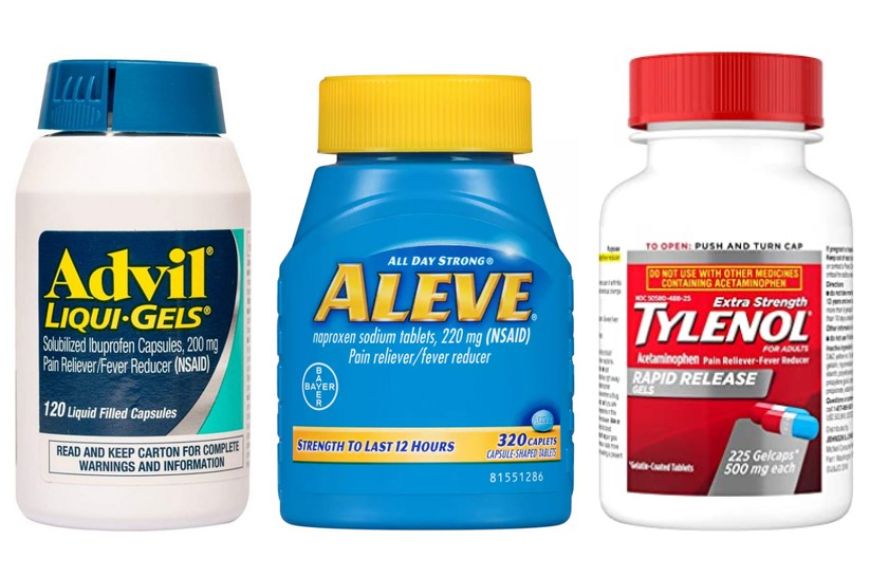
23 Apr Is Advil or Tylenol Better for Headaches – A Complete Guide to Choosing the Right Relief!
When a pounding headache strikes, most people reach for quick relief — and the two most common over-the-counter options are Advil (ibuprofen) and Tylenol (acetaminophen). But which one actually works better for headaches? The answer depends on the type of headache, your overall health, and how your body responds to medication.
In this article, we’ll break down the differences between Advil and Tylenol, when to use each, and which might be the better option for you.
Advil vs. Tylenol: What’s the Difference?
- Tylenol is a brand name for acetaminophen, a pain reliever and fever reducer that doesn’t reduce inflammation.
Both can treat headaches effectively, but they work in different ways within the body.
Which Is Better for Headaches?

Advil (Ibuprofen) may be better if:
- Your headache is caused by inflammation, like a sinus headache
- You also have muscle tension or body aches
- You’re dealing with a migraine, as NSAIDs are often recommended
Tylenol (Acetaminophen) may be better if:
- You have sensitive stomach or a history of ulcers
- You can’t take NSAIDs due to kidney issues or bleeding risks
- You’re pregnant (with doctor approval)
Both drugs are effective for tension headaches, but ibuprofen may provide stronger, longer-lasting relief for inflammatory-related pain.
Important Safety Considerations
- Do not mix Advil and Tylenol unless directed by a doctor.
- Tylenol in high doses can harm the liver.
- Advil may irritate the stomach or affect the kidneys, especially with long-term use.
Always follow dosage guidelines and talk to your healthcare provider if you use pain relievers often.
Tips for Choosing the Right Headache Medicine
- Read labels carefully to understand dosage and ingredients
- Drink plenty of water — dehydration can worsen headaches
- Try other remedies like cold compresses, rest, or caffeine, depending on the headache type
- If you get frequent headaches, track them and share the pattern with your doctor
Understanding the Root Causes of Your Headache
Before choosing a pain reliever, it’s important to identify what type of headache you’re dealing with—tension, migraine, sinus, or something else. Knowing the cause helps determine whether inflammation is involved, which influences whether Advil or Tylenol is more effective.
Comparing Advil and Tylenol: How They Work

Advil (ibuprofen) is an NSAID that reduces inflammation, while Tylenol (acetaminophen) targets pain and fever. Each works differently in the body, and the right choice may vary based on your specific symptoms and medical history.
Side Effects and Safety: What You Need to Know
Both medications are safe when used correctly, but they come with different risks. Advil may irritate the stomach and kidneys, while Tylenol can affect the liver in high doses. Understanding these side effects can help you make an informed choice.
When to See a Doctor About Your Headaches
If you’re relying on over-the-counter pain relievers often, it may be time to seek medical advice. Frequent headaches could be a sign of an underlying issue that needs professional treatment beyond Advil or Tylenol.
FAQs:
1. Is Advil stronger than Tylenol for headaches?
Advil may be more effective for headaches involving inflammation or migraines, while Tylenol is better for general pain and milder headaches.
2. Can I take Advil and Tylenol together?
In some cases, doctors recommend alternating them, but never mix them without medical guidance.
3. Which is safer: Advil or Tylenol?
Both are safe when taken as directed, but Tylenol may be gentler on the stomach, while Advil might be better for inflammation.
4. Which works faster: Advil or Tylenol?
Both work within 30–60 minutes, though ibuprofen may last longer in some cases.
5. Should I take pain relievers for every headache?
No. Try natural remedies first, and use medication only when necessary to avoid overuse headaches.
Conclusion:
When it comes to “Is Advil or Tylenol better for headaches?”, the best choice depends on your symptoms, health history, and the cause of your headache. Advil is often preferred for migraines and inflammation, while Tylenol is a solid option for general pain relief with fewer stomach risks.If headaches are frequent or severe, it’s always best to consult a healthcare provider for a personalized treatment plan.

No Comments